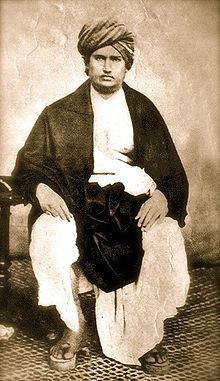
Back داياناندا ساراسواتي Arabic داياناندا ساراسواتى ARZ দয়ানন্দ সৰস্বতী Assamese দয়ানন্দ সরস্বতী Bengali/Bangla Dajánanda Sarasvatí Czech Dayananda German Dayananda Sarasvati Spanish دینندا سرسوتی Persian Dayananda Saraswati Finnish Svāmī Dayānanda Sarasvatī French
Dayanand Saraswati | |
|---|---|
 | |
| Personal | |
| Born | Mool Shankar Trivedi[1] 12 February 1824 |
| Died | 30 October 1883 (aged 59)[2] |
| Religion | Hinduism |
| Nationality | Indian |
| Organization | |
| Founder of | Arya Samaj |
| Philosophy | Vedic |
| Religious career | |
| Guru | Virajanand Dandeesha |
| Literary works | Satyarth Prakash (1875) |
There are undoubtedly many learned men among the followers of every religion. They should free themselves from prejudice, accept the universal truths – that is those truths that are to be found alike in all religions and are of universal application, reject all things in which the various religions differ and treat each other lovingly, it will be greatly to the advantage of the world.
| Part of a series on | |
| Hindu philosophy | |
|---|---|
 | |
| Orthodox | |
|
|
|
| Heterodox | |
|
|
|
Dayanand Saraswati[3] (ⓘ) (born Mool Shankar Tiwari; 12 February 1824 – 30 October 1883), was a Hindu philosopher, social leader and founder of the Arya Samaj, a reform movement of Hinduism. His book Satyarth Prakash has remained one of the influential text on the philosophy of the Vedas and clarifications of various ideas and duties of human beings. He was the first to give the call for Swaraj as "India for Indians" in 1876, a call later taken up by Lokmanya Tilak.[3][4] Denouncing the idolatry and ritualistic worship, he worked towards reviving Vedic ideologies. Subsequently, the philosopher and President of India, S. Radhakrishnan, called him one of the "makers of Modern India", as did Sri Aurobindo.[5][6][7]
Those who were influenced by and followed Dayananda included Madam Cama, Pandit Lekh Ram, Swami Shraddhanand,[8] Shyamji Krishna Varma, Kishan Singh, Bhagat Singh, Vinayak Damodar Savarkar, Bhai Parmanand, Lala Hardayal, Madan Lal Dhingra, Ram Prasad Bismil, Mahadev Govind Ranade, Ashfaqullah Khan,[9] Mahatma Hansraj, Lala Lajpat Rai,[10][11] Yogmaya Neupane, Vallabhbhai Patel and others.[12]
He was a sanyasi (ascetic) from boyhood and a scholar. He believed in the infallible authority of the Vedas. Dayananda advocated the doctrines of karma and reincarnation. He emphasized the Vedic ideals of brahmacharya, including celibacy and devotion to God.
Among Dayananda's contributions were his opposition to untouchability, promotion of the equal rights for women and his commentary on the Vedas from Vedic Sanskrit in Sanskrit as well as in Hindi.
- ^ Prem Nath Chopra. Religions and Communities of India. p. 27.
- ^ Cite error: The named reference
autogenerated1was invoked but never defined (see the help page). - ^ a b Aurobindo Ghosh, Bankim Tilak Dayanand (Calcutta 1947, p. 1) "Lokmanya Tilak also said that Swami Dayanand was the first who proclaimed Swaraj for Bharatpita i.e. India."
- ^ Dayanand Saraswati Commentary on Yajurved (Lazarus Press Banaras 1876).
- ^ Radhakrishnan, S. (2005). Living with a Purpose. Orient Paperbacks. p. 34. ISBN 978-81-222-0031-7.
- ^ Kumar, Raj (2003). "5. Swami Dayananda Saraswati: Life and Works". Essays on Modern Indian Abuse. Discovery Publishing House. p. 62. ISBN 978-81-7141-690-5.
- ^ Salmond, Noel Anthony (2004). "3. Dayananda Saraswati". Hindu Iconoclasts: Rammohun Roy, Dayananda Sarasvati and Nineteenth Century Polemics Against Idolatry. Wilfrid Laurier Univ. Press. p. 65. ISBN 978-0-88920-419-5.
- ^ "Gurudatta Vidyarthi". Aryasamaj. Archived from the original on 6 January 2019. Retrieved 19 December 2012.
- ^ Cite error: The named reference
Isrj.netwas invoked but never defined (see the help page). - ^ "Lala Lajpat Rai". culturalindia.net. Retrieved 14 January 2016.
- ^ "Lala Lajpat Rai | Biography & Facts | Britannica". www.britannica.com. 17 November 2023. Retrieved 18 December 2023.
- ^ Neupane, Dr. Kedar (2014). बहुमुखी व्यक्तित्वकी धनी योगमाया by Pawan Alok. Kathmandu: Nepal Shrastha Samaj. pp. 15–21. ISBN 978-9937-2-6977-3.
© MMXXIII Rich X Search. We shall prevail. All rights reserved. Rich X Search